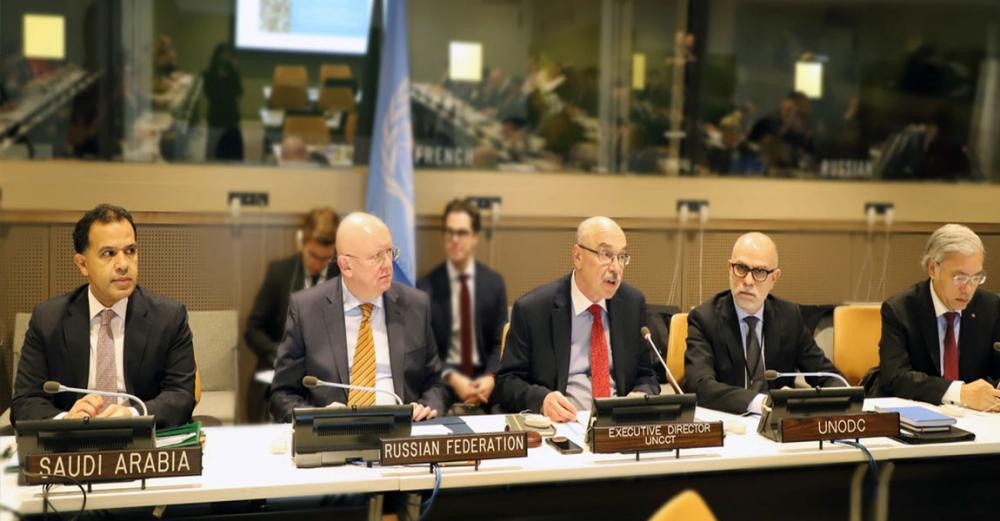Just Earth News | @justearthnews | 22 Feb 2020

New York : Cheap and easily accessible small arms are increasingly becoming the “weapon of choice” for many terrorist groups, the UN counter-terrorism chief told an event on Friday aimed to raise awareness of the nexus between terrorism, organized crime and illicit small arms trafficking.
“Insufficient international response in countering the illicit trafficking of small arms and light weapons, the challenges that Member States face to detect and seize them, as well as porous borders, allow terrorists and criminals to move illicit weapons from one country or region to another,” said Vladimir Voronkov, UN Under-Secretary-General for Counter-Terrorism.
It is widely acknowledged that the connection between terrorism and organized crime, including illicit small arms and light weapons trafficking, is a serious threat to international peace and security. It is also an obstacle to sustainable development and a menace to the rule of law.
To illustrate the challenges, Voronkov, who is also Executive Director of the UN Counter-Terrorism Centre (UNCCT),
of the UNOffice of Counter-Terrorism (UNOCT), revealed estimates indicating that the African continent alone has one hundred million uncontrolled small arms and light weapons concentrated in crises zones and security-challenged environments.
“With an estimated population of 1.2 billion in Africa, this is an unfortunate and significant ratio of one to 12”, he lamented.
Global Counter-Terrorism Strategy
Without a strong international response, terrorists and criminals would easily be able to move illicit weapons from one country or region to another.
The UN Global Counter-Terrorism Strategy underlines the connection between terrorism and the illicit small arms trafficking, conventional ammunitions and explosives, and calls on Member States to strengthen coordination and cooperation to address this challenge.
The UNOCT chief illustrated this through the example that “illicit weapons originating from Libya were finding their way into the Lake Chad Basin and the Sahel”.
Since ast year, UNOCT and the UN Office on Drugs and Crime (UNODC) worked closely with the UN Counter-Terrorism Committee Executive Directorate (CTED) and UN Office for Disarmament Affairs (ODA) to develop a project enhancing national legislative, strategic and operational capacities to prevent, detect and counter the firearms trafficking and other illegal activities related to terrorism and organized crime in Central Asia.
“The project is also another example of our ‘All-of-UN’ approach to support counter-terrorism efforts of Member States”, concluded Mr. Voronkov.
No country alone
In her video statement, UNODC Executive Director Ghada Fathi Waly affirmed her Office’s “unique approach” to addressing the complex interlinked challenges of terrorism, crime and corruption.
Using a “holistic approach”, Waly maintained that the project tackles “the full range of obstacles”.
She singled out adequate legal frameworks, strengthening law enforcement and criminal justice capacity, improving data and addressing cooperation gaps, saying that it is “essential to deal effectively with threats that no country can face alone”.
UNODC supports nations in implementing global counter-terrorism instruments, as well as the Firearms Protocol to the UN Convention against Transnational Organized Crime, through the UNODC Global Firearms Programme.
“I will be eagerly following the project’s advancement and I hope that its outcomes and learnings can inform the international community’s efforts, feeding into the next reviews of the UN Global Counter-Terrorism Strategy, this year and in 2022”, concluded the UNODC chief.
Preventing terrorists’ access
Meanwhile, CTED Deputy Executive Director Weixiong Chen pointed out that the new initiative is “one of the important requirements of several relevant Security Council resolutions”.
Citing five resolutions, he noted that “the Council has repeatedly stressed the importance to prevent terrorist access to weapons”.
Chen noted that the most recent resolution, 2317, brought a comprehensive new set of topics and domains, saying that they have strengthened CTED’s mandate, particularly through its “assessments, analyses and identification of gaps”.
The CTED chief underscored the importance of Member States’ will to implement Security Council resolutions on preventing illicit small arms and light weapons trafficking and concluded by sharing his hope “that OCT and UNODC will be able to fully utilize CTED’s expertise and recommendations in this field”.
The launch also introduced the new project’s activities, including missions to assess regional situations, relevant legislation and response capacities to the threat posed by firearms trafficking, terrorism and related crimes.
Photo caption and credit:
UN Office of Counter-Terrorism
Director of the UN Office of Counter-Terrorism, Under Secretary-General Vladimir Voronkov presents the project “Preventing and combatting the illicit trafficking of small-arms and light weapons and their illicit supply to terrorists” – addressing the terrorism-arms-crime nexus.